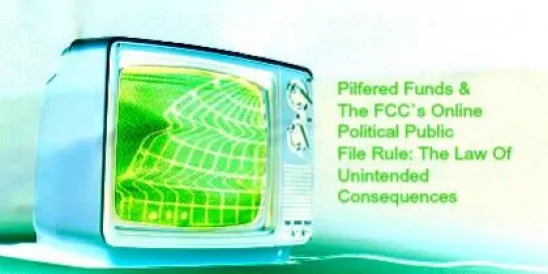First, here’s how the evil-doers are apparently accessing the bank accounts. As nearly every broadcaster knows, last year the FCC concluded its long running effort to have television stations place their local public file on the internet. As a part of the new rules, broadcasters affiliated with the top four national television broadcast networks in the top 50 DMAs are required to upload their political files to an FCC-maintained website. All other TV broadcasters must begin to upload new political files on July 1, 2014.
FCC rules require the following materials to be placed in the political public inspection file, and therefore on the Commission’s website:
To show the disposition of the request, the file must among other things, include a schedule of the time purchased, the rates charged, and the classes of time purchased.
In the past, many broadcasters complied with these requirements by simply putting copies of the ad buy order and the payment check in their local public file. This minimized the time required for compliance and, in a pre-internet world, presented few risks.
When the new rule was under consideration, many broadcasters feared that they would have to spend precious time and resources inputting information into new electronic forms and performing other new tasks. The Commission assured these broadcasters that they would only have to post online the same materials they had previously maintained in the hard-copy local public file. To facilitate the process, the Commission website allows materials to be uploaded in PDF format without any filter or FCC review.
As a result of these recent events, we anticipate that broadcasters may see new provisions in their order placements and their agreements with media time buyers prohibiting them from posting buyers’ checks to the public file. Even without a specific request or contractual provision, broadcasters should refrain from including bank information in the political file as a general liability mitigation strategy. While it may require the expenditure of some time, a better practice is for broadcasters to provide a short summary of the information necessary to comply with the Commission’s political file rules.
While the online political file requirements do not apply to radio stations – at least not yet – these events are nonetheless instructive. Since members of the public are entitled to have copies of materials in a radio station’s file, it is good policy for the station to follow the same practice of providing a short summary of the required information and purging the file of copies of the checks used to pay for political advertising



 />i
/>i

